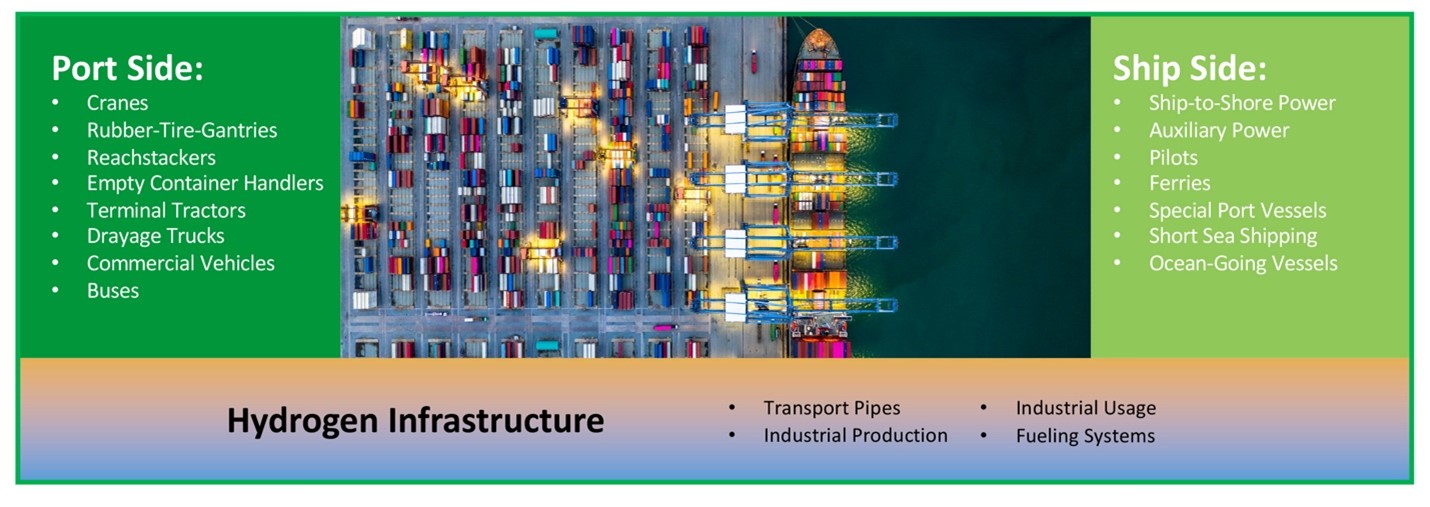Port and maritime applications are in the vanguard as drivers for accelerating hydrogen adoption. Container handling and other diesel equipment used around the clock at shipping ports are a source of significant local air pollution and greenhouse gases, compounded by emissions from heavy-duty trucks that travel within and beyond port boundaries and from vessels approaching from the sea or used in the harbor.
Lucien Robroek, Nuvera’s president and CEO, took center stage at the World Hydrogen Summit at the Port of Rotterdam in May 2022 for a session entitled Hydrogen & Maritime: Solutions, Innovations & Timescales. Equipped with green hydrogen infrastructure, ports will be at the epicenter of global clean energy transformation. Hydrogen-powered vehicles meet the intensive duty cycles, unpredictable and long-distance routes, charging infrastructure uncertainty, and high auxiliary power requirements of many heavy-duty work cycles associated with port operations.
Lucien described how Nuvera® E-Series Fuel Cell Engines, which are available today, can meet many power needs within port ecosystems, including motive and stationary applications shown below.

During Lucien’s presentation, he emphasized that adequate hydrogen supply and infrastructure underlies any successful transition from diesel fuel and fossil feedstocks, whether at ports or in other industries relying on heavy-duty vehicles and equipment. An overlooked aspect of sustainable and widespread zero-emission vehicle adoption is the availability of electrical supply for battery-only platforms. Recently, two Dutch electric utilities announced that no new commercial customers will be connected to the high-voltage grid because it is at capacity in the Netherlands’ two major southern provinces – and neither will existing customers be able to expand their access to electricity. Approvals to add overhead power lines to meet increasing demand will take approximately eight years, and actual construction an additional two years.
The same constraints face both industrial and developing regions around the world. While green hydrogen infrastructure build-out will require significant investment, it must be recognized that increased electrical supply also comes at a high price. Battery and fuel cell electric vehicles each have their place in a carbon neutral economy, and appropriate uses should be made of both. Among government and NGO energy and environmental policy experts, there is growing consensus that the required infrastructure investments are a bargain compared with the economic, health and social consequences societies will bear if nothing is done to mitigate effects of climate change.
Lucien’s presentation and the panel discussion at the World Hydrogen Summit are available for viewing here. Lucien was also interviewed in the Port of Rotterdam “PortCast,” during which he described the design of Nuvera’s fuel cell engines and their use at ports and in other applications.
Nuvera is already helping to accelerate the greening of ports, Here is a roundup of Nuvera’s latest port-related initiatives.
Nuvera-Powered Hyster Fuel Cell Toploader Takes a Test Drive
Nuvera is working with Hyster-Yale Group (HYG) to deliver high-performance alternatives to diesel port equipment. The new Hyster® fuel cell top loading container handler powered by Nuvera recently hit the ground for a test drive in HYG’s Big Truck Development Center in Nijmegen, Netherlands. We are excited to see it soon at work in the Port of Los Angeles, another indication that the future of clean, hydrogen-powered port equipment has arrived.
Nuvera to Power Hydrogen Vehicles at Hamburg’s New Clean Port & Logistics Innovation Cluster
Nuvera will power other heavy-duty electric vehicles currently being developed, including the first-ever empty container handler equipped with fuel cell technology in a real-world application, and a fuel cell terminal tractor.
The hydrogen fuel cell-powered equipment is expected be deployed at Hamburger Hafen und Logistik AG (HHLA) Container Terminal Tollerort in Hamburg, part of Clean Port & Logistics (CPL), an innovation cluster to test hydrogen-powered port logistics equipment. CPL aims to test the usage of large equipment powered by hydrogen in container handling to support and accelerate zero-emissions vehicles and equipment into regular port operations.
The delivery of the Hyster® terminal tractor is planned for the fourth quarter of 2022, followed by the empty container handler (ECH) in early 2023. Both will be powered by Nuvera fuel cell engines and run on hydrogen fuel produced locally at the HHLA Hamburg Green Hydrogen Hub.
The hydrogen fuel cell-powered ECH will be powered by Nuvera’s E-60 fuel cell engine, while the terminal tractor will be powered by its E-45 fuel cell engine. The trucks will share many of the same components such as drive motor, battery modules, converters, hydrogen tanks and controls.
Capacity Trucks Leverages Nuvera in Partnership with Hyster-Yale
Capacity and Hyster-Yale are jointly developing electric and hydrogen-powered terminal tractors with automation-ready capabilities, bringing together Capacity’s terminal truck platform, Hyster-Yale Group’s experience in lift truck electric powertrain technology, and Nuvera’s hydrogen fuel cell products. This partnership addresses the demand for environmentally sustainable terminal tractor solutions in port terminal and distribution center applications.
Nuvera® E-Series Fuel Cell Engines for heavy-duty applications allow port authorities and terminal operators to comply with tightening emissions regulations and mandates and remain economically competitive by providing high-performance zero-emission power solutions. To learn more about how Nuvera helps meet the needs of ports and many other applications, contact us.
